July 11, 2025. Asia Tour Lecture (3) Hong Kong
Hello. Today marks the third stop of the Asia tour lectures, where Venerable Pomnyun Sunim’s Dharma Q&A is being held in Hong Kong.
After completing morning practice and meditation, Sunim had breakfast at the accommodation at 6:30 AM. After expressing gratitude to Ms. Lee Hye-jin, who had lent her home for the overnight stay, they headed to Ho Chi Minh Airport together at 7:30 AM.
Arriving at Ho Chi Minh Airport at 8:40 AM, Sunim greeted members of the Ho Chi Minh Jungto Society who had come to see him off, then proceeded with departure procedures.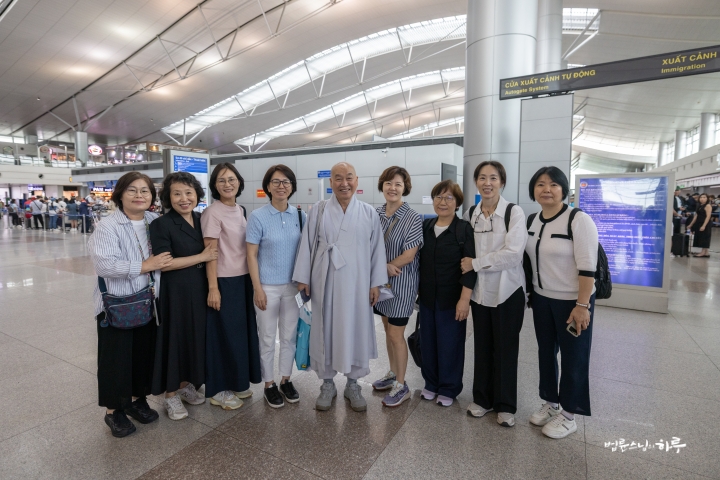
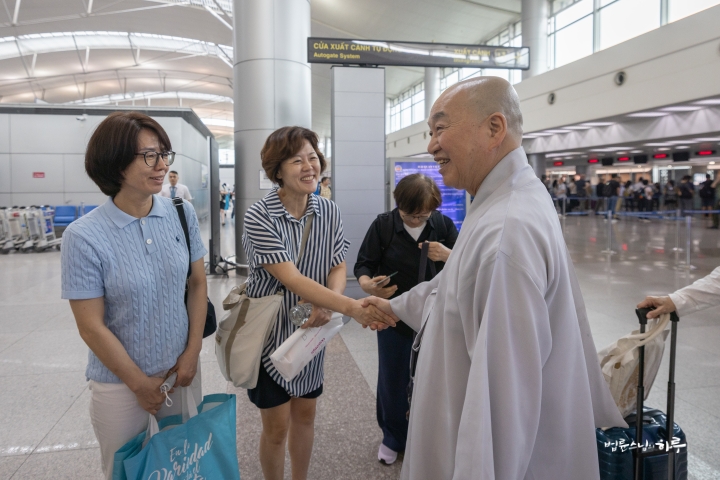
The flight scheduled to depart at 11:05 AM was delayed by an hour, taking off from Ho Chi Minh Airport after noon.
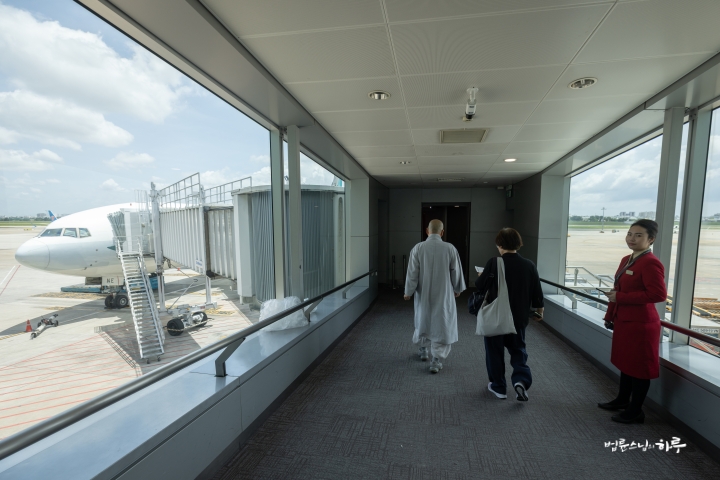
After a three-hour flight, the plane landed at Hong Kong Airport at nearly 4:00 PM local time.
When the Suim exited the airport after going through immigration and collecting his luggage, members of the Hong Kong Jungto Society warmly welcomed him.
“Thank you for making such a long journey.”
“The airplane did the work. I just sat still.” (laughter)
“Sunim, we’re just happy you arrived safely. Until yesterday, there was so much rain from the typhoon that schools were almost closed today. But today there’s no rain, and the heat has subsided.”
After exchanging warm greetings and taking commemorative photos, they immediately headed to the accommodation.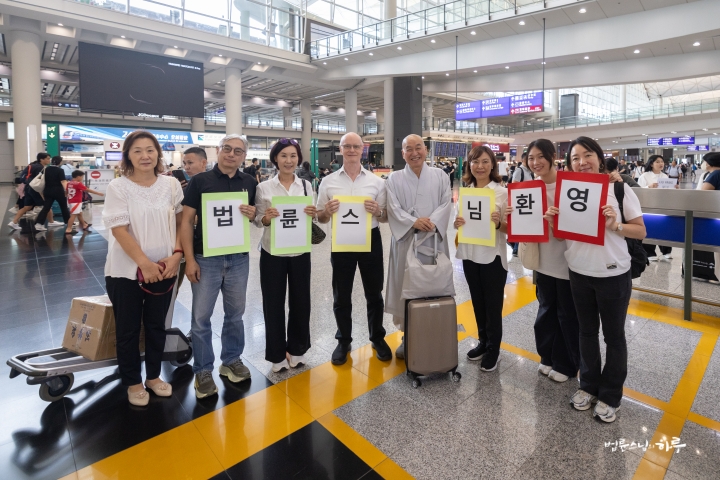

They arrived at the accommodation at 5:40 PM.
“We left at 7:30 AM, and the whole day was spent just traveling.”
After just dropping off luggage at the accommodation, without time for dinner, they headed to the lecture venue at 6:10 PM. The venue was only 10 minutes away from the accommodation, so they arrived quickly.
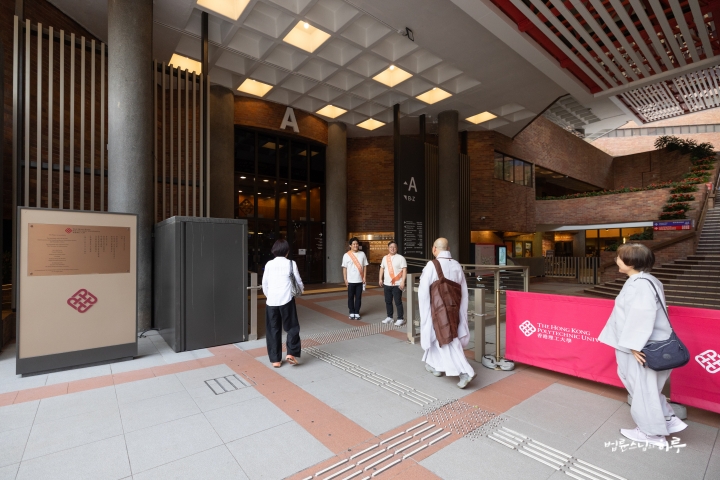
Today’s lecture is being held at the Chiang Chen Studio Theatre, located within The Hong Kong Polytechnic University. Upon arrival at the venue, volunteers were warmly welcoming the audience at the entrance.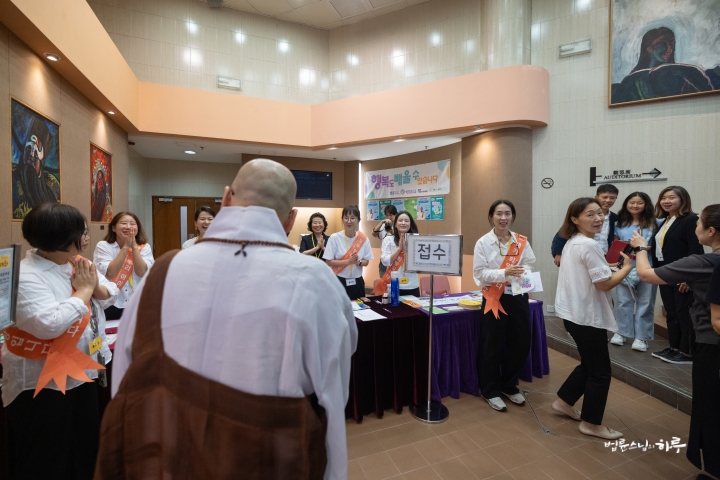
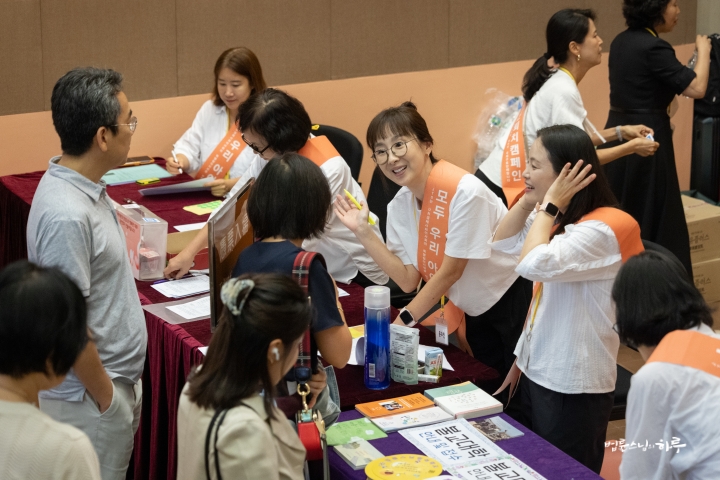
After expressing gratitude to the volunteers, Sunim had tea in the waiting room with local dignitaries, including the president of the Korean Association in Hong Kong and members of the Hong Kong Chamber of Commerce.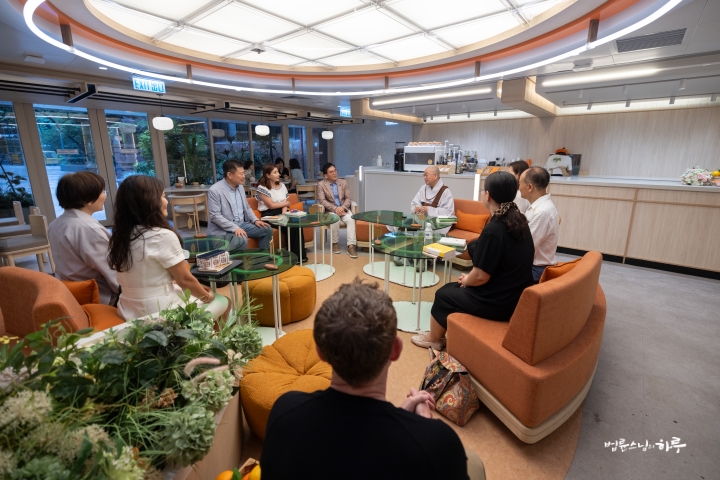
This was his first visit to Hong Kong in six years since attending a lecture organized by the Hong Kong Chamber of Commerce in 2019. The local dignitaries had many questions for Sunim.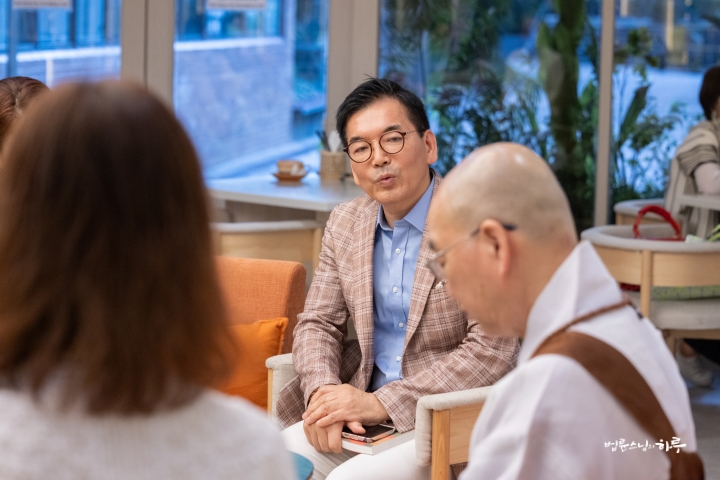
“Sunim, may I ask you a question?”
“Why does everyone want to ask questions as soon as they see me? Go ahead and ask.” (laughter) 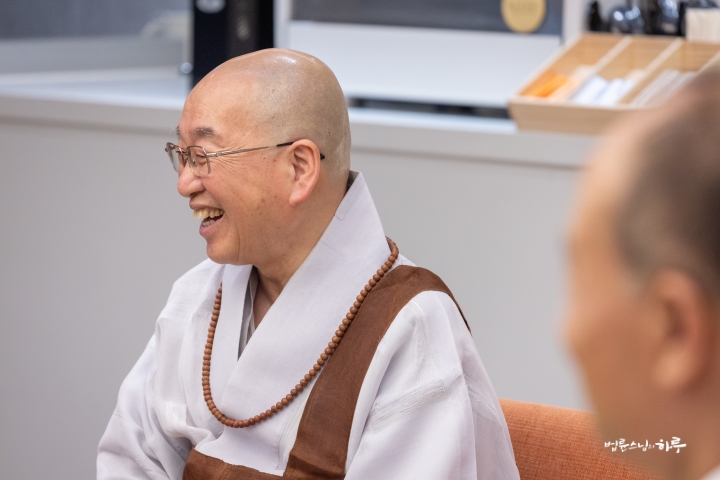
The president of the Korean Association asked his question first. Sunim answered with a smile.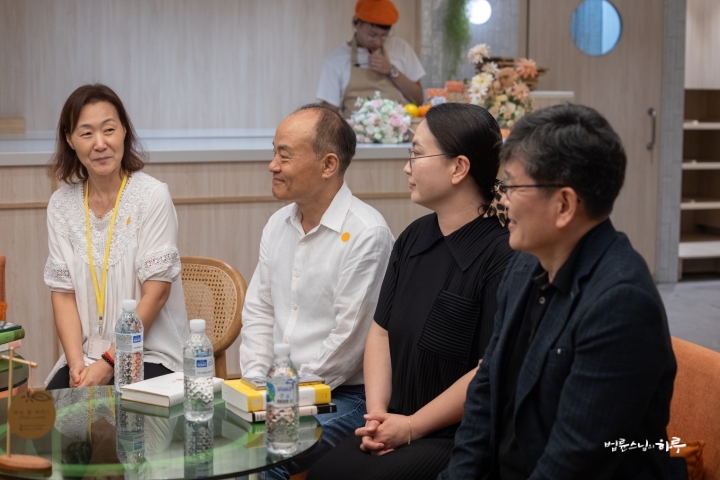
“You’ve given so many lectures around the world. What would you say is the most common question?”
“Why are you curious about that? I just answer whatever is asked, so I’ve never thought about what questions people ask most. If I had to categorize them, most questions are about difficulties in human relationships.”
The president of the Korean Association shared his own concerns about communication difficulties. Sunim talked about how to communicate well.
How Can We Communicate Better?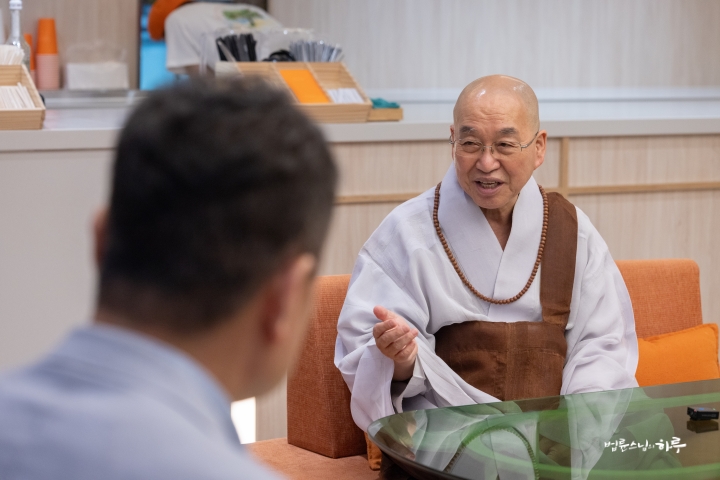
“In this world, are there more people who think like you or more who think differently? The majority think differently from you, and that should be considered normal. Meeting someone who thinks the same as you is just a rare occurrence. Therefore, if you start conversations assuming others will think like you, communication becomes difficult. Communication becomes easier when you start with the premise that others think differently. When you expect differences but then discover commonalities – same hometown, same religion, same school – you quickly become friends. From that point, you assume you’re the same. But once you become friends or get married, you keep discovering differences. This leads to conflict and eventually separation. People are neither the same nor different by nature. Everyone has both similarities and differences. When we discover similarities, we start relationships, but after that, we keep finding differences and end up separating. If you start conversations with the premise that people are different, communication becomes much easier.”
“When I told someone I was coming to Venerable Pomnyun Sunim’s lecture today, they questioned why the president of the Korean Association would attend a Buddhist event. I replied that I wasn’t going to a Buddhist event but to study life, but we clearly had different perspectives.”
“That person must be Christian. From their perspective, they could see it that way.” 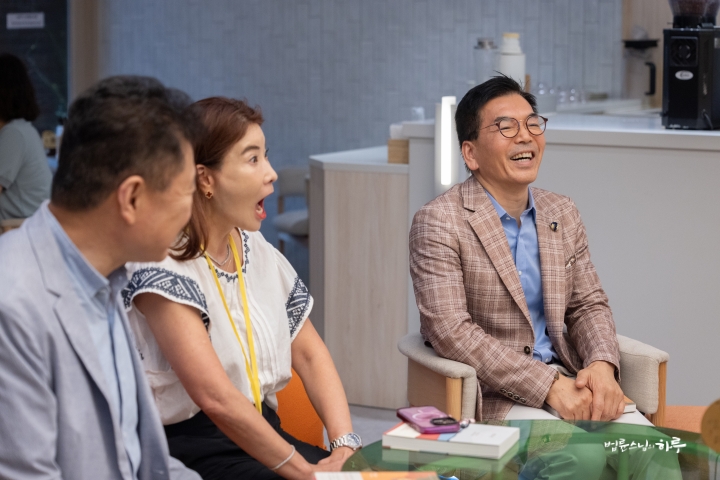
While having tea, a samulnori (traditional Korean percussion) performance began at 6:40 PM. After finishing tea, everyone moved to the lecture hall to watch the performance. Students learning samulnori at the Hong Kong Korean Cultural Center gave an energetic percussion performance.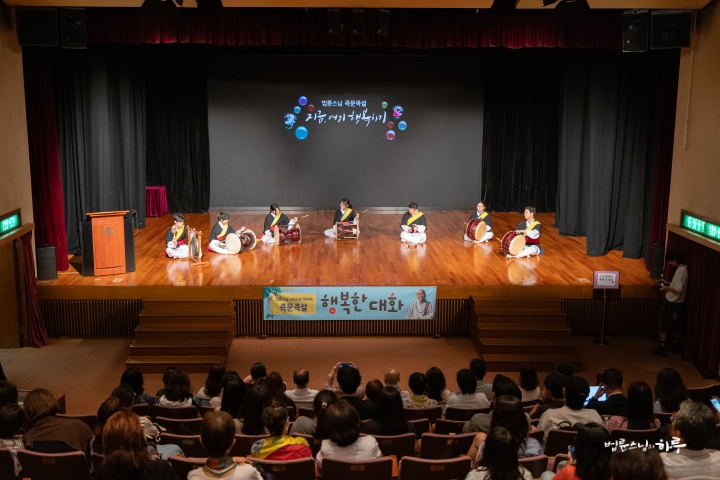
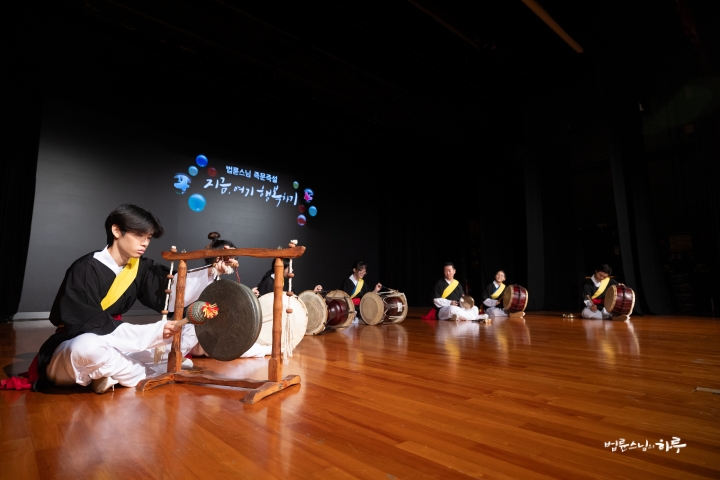
After the lively samulnori performance ended, an introductory video about Sunim was shown on stage. When the video ended, Sunim came up on stage. Loud applause and cheers erupted from the audience.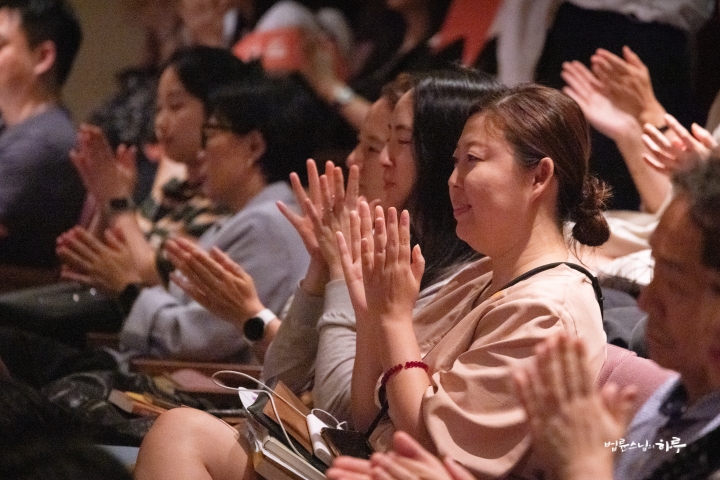
The Chiang Chen Studio Theatre was filled with over 200 Korean residents. Sunim greeted them with a smile.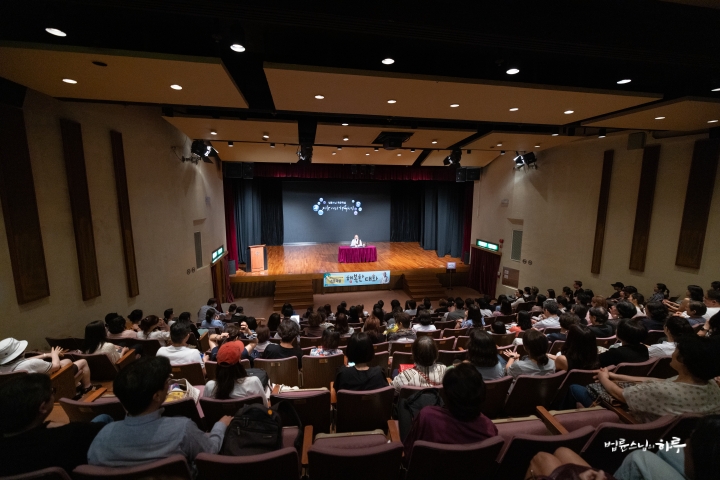
“Have you all been well? I gave a lecture in Hong Kong in 2019, and this is my first visit back in six years since the COVID pandemic. Please raise your hand if this is your first time attending my lecture.” 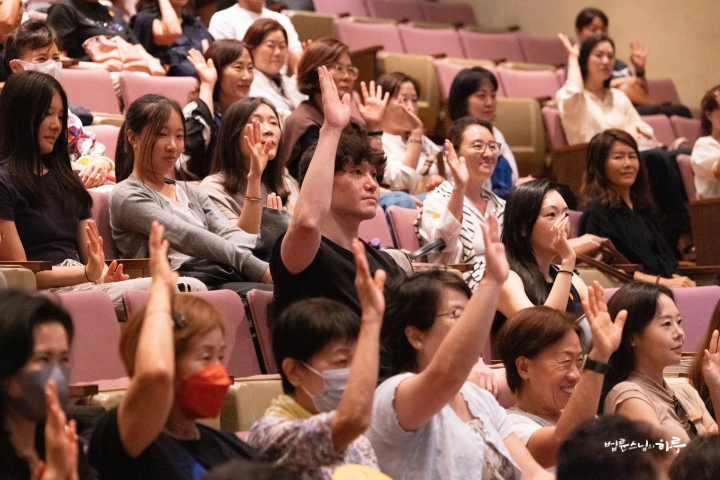
The majority raised their hands. Sunim explained the purpose of Dharma Q&A and began the dialogue.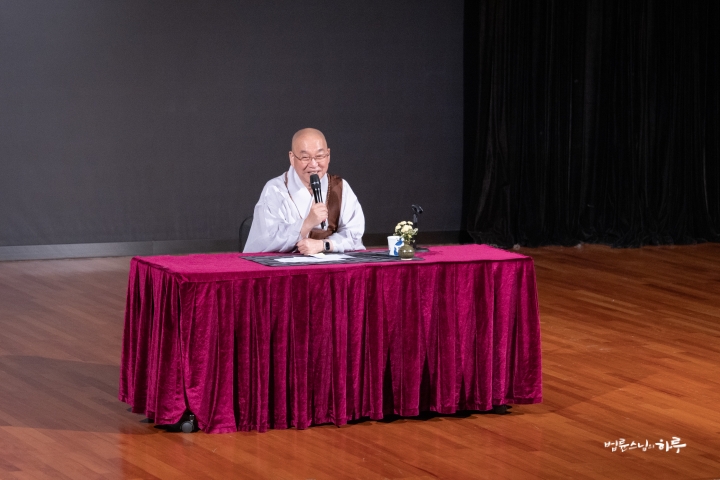
“You’ve probably watched many Dharma Q&A sessions on YouTube. In 2014, I traveled around the world giving lectures in 115 cities over 115 days. I think I stopped by Hong Kong then too. And I gave a lecture in 2019 when invited by the Chamber of Commerce. Anyway, it’s nice to meet you all.
Today’s lecture is not a Buddhist event. It’s a gathering where we discuss how we can live happily without suffering. Just because the speaker is a monk doesn’t make it a Buddhist event. Today is an opportunity to freely discuss the concerns we face in our lives.” 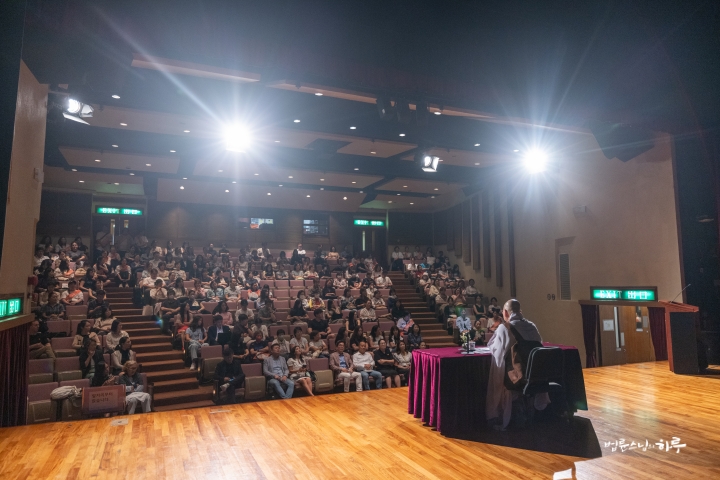
Before the lecture began, those who had submitted questions in advance raised their hands and engaged in conversation with Sunim. Over the course of two hours, 10 people asked Sunim questions. Since there are many international schools in Hong Kong, many attendees had concerns about their children’s education. One parent, who is raising a son and daughter, sought Sunim’s advice on how to mediate when the two frequently fight.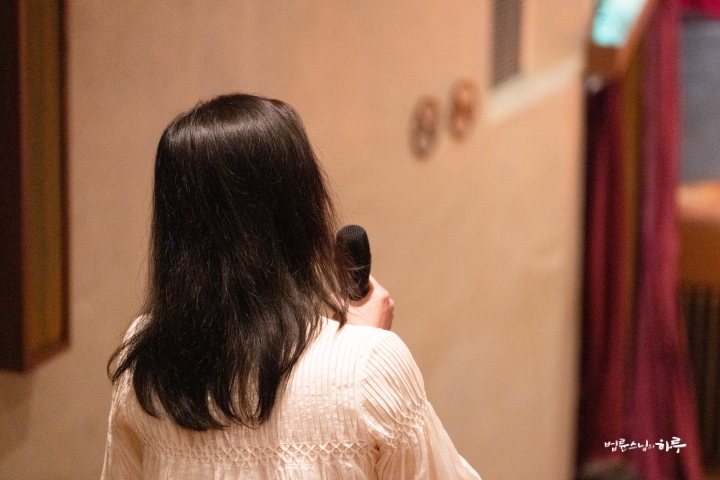
My Children Fight Frequently. How Should Parents Mediate?
“It would be better not to watch those videos. I don’t know which video you watched, but it seems like it was presented by someone who knows nothing about child-rearing. In other words, it’s an explanation from an adult’s perspective, not a child’s perspective. The diagnosis itself that ‘children naturally don’t listen’ is wrong. Who unilaterally decides ‘do this’ or ‘do that’? I, the adult, am deciding unilaterally. If you ask ‘What would you like to do?’ and make a mutual agreement, but the child doesn’t follow through, then the child has broken the promise. But saying things like ‘You come home early’ or ‘You behave this way’ – that’s something I’ve decided unilaterally. If I unilaterally decide something and then define the child as ‘not listening’ when they don’t follow it, that perspective itself is already undemocratic. The fundamental perspective on children is flawed. 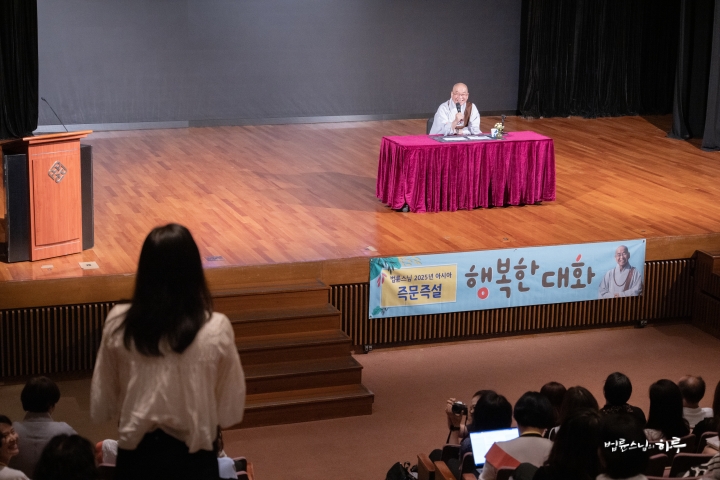
When teachers teach children at school, scolding them for not knowing is not proper education. They come to learn because they don’t know – why would they come to learn if they already knew? We need to teach them because they don’t know. If they don’t understand after being taught once, we need to teach them twice. If they don’t understand after twice, we need to teach them three times. If they don’t understand after three times, we need to teach them four times. This is completely different from ‘not listening.’
We still think of school as a place for teaching, but this is a misconception. If school is a place for teaching, then teachers are the masters of the school. In the old days, private tutoring schools were the teacher’s kingdom. But school is a place for learning. School is where those who don’t know go to learn. When we define school as a place for learning, who is the master? The students are the masters. Teachers become support staff. Teachers are assistants who help with what students don’t know, not the masters of the school. If they don’t understand after ten times, you need to teach them eleven times. If they don’t understand after twenty times, you need to teach them twenty-one times. 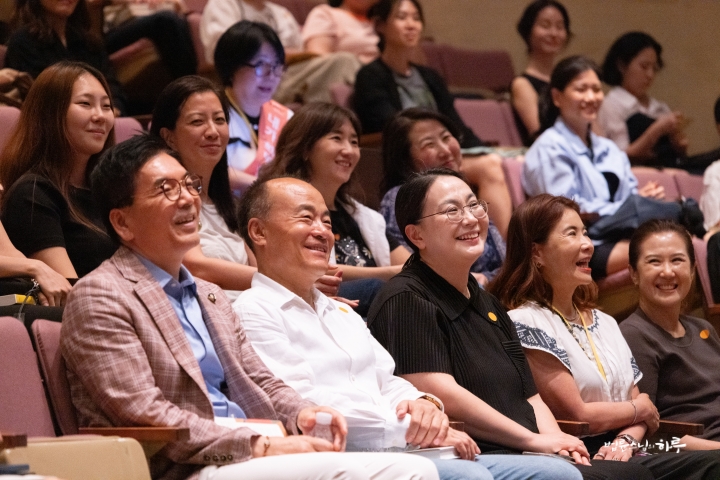
The same principle applies when raising your children. Parents are helpers to their children. Children are not your possessions. Once a child becomes an adult, you don’t need to help them anymore because your parental obligations have ended. However, until they reach adulthood, parents must provide assistance. If they don’t know how to eat, you must teach them how to eat. If they don’t know how to walk, you must teach them how to walk. If they don’t understand ethics and morals, you must teach them. But children don’t learn everything from being taught just once. The same is true for adults. When I announce at the temple, ‘After using the meditation cushion, please arrange it neatly before leaving,’ will all one hundred people actually arrange them neatly? When we actually test this, about half will arrange them neatly after just one explanation. But the other half won’t. They’ll leave them crooked or won’t do it at all. So the following week, I make the announcement again. Then about 70 percent arrange them neatly, while 30 percent still don’t. After the third announcement, 80 percent do it, but 20 percent still don’t. Even after five announcements, 5 to 10 percent continue not to do it. At that point, I call those people aside and say, ‘Don’t just toss it down with one hand. Please use both hands to place it neatly.’ Only after repeating this instruction two or three times does the compliance rate rise to about 95 percent.
This is human nature, even for adults. So with children, when they don’t follow instructions after one explanation, you need to explain again. If they still don’t do it, you need to explain once more. This problem arises from not fully understanding children’s characteristics. You might think, ‘I’ve told them, so they should understand,’ but the child hasn’t properly grasped it yet. 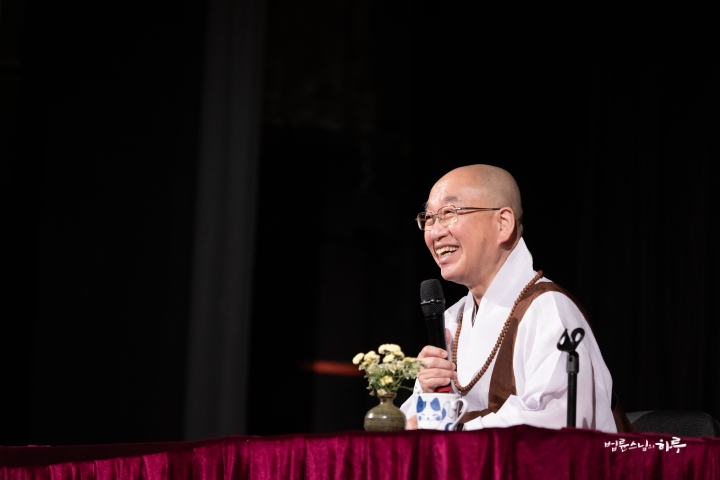
What does it mean to understand? When you say you understand Sunim’s words, it means you’re comparing what Sunim says with what you already knew in the past. People who don’t have prior knowledge can’t understand. It’s because they lack the foundation for understanding. That’s why when learning is delayed, comprehension continues to decrease. You build on what you know to learn the next thing, and then build on that knowledge to learn what comes after. Without this foundation, understanding is bound to be slow. That’s why we need to teach children step by step and repeat things over and over. You shouldn’t get angry or frustrated when they don’t understand. The reason you get frustrated is because you unconsciously think of the child as an adult. You’re not thinking of them as a young child.”
“I told my child to brush their teeth before going to bed at 10 PM. But the child said they would read a little first, and even after 10 minutes, they still hadn’t done it. When I asked, ‘Why haven’t you brushed your teeth yet?’ they replied, ‘I’ll do it after reading a bit more.’ After asking four or five more times and it’s past 11 PM, I find myself getting angry at the child without realizing it. The child only listens when I get angry.”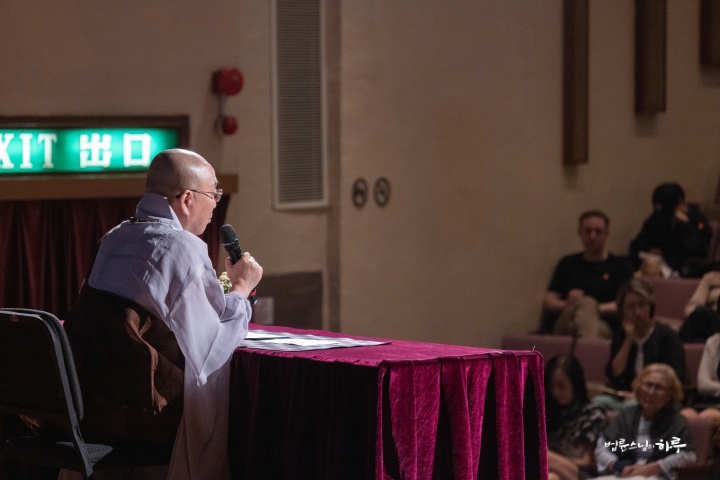
“That means the child is brushing their teeth not by their own will, but due to the parent’s forceful power. In such cases, psychological suppression occurs in the child. This suppressed psychology becomes a cause for resistance against parents during adolescence. From the child’s perspective, they haven’t fully understood why they need to go to bed at 10 PM or why they need to brush their teeth. You need to start a conversation about these points first.
The child might ask back, ‘Dad doesn’t go to bed at 10 PM, so why do I have to?’ Of course, even if parents show the example by turning off the lights and going to bed at 10 PM first, not all children will go to bed at 10 PM. If parents consistently show themselves not watching TV and reading books instead, and then tell their child to ‘stop watching TV and read a book,’ the educational effect is much higher. This is because children have the characteristic of imitating their parents’ behavior. However, education is difficult even when you do this. But most parents come home late while telling their children to come home early, watch TV themselves while telling their children not to, or go to bed late while telling their children to go to bed early. Then the child thinks to themselves, ‘Dad doesn’t do it either…’ and slams the door as they go into their room.
Suppressed psychology only builds resistance and has no educational effect. It only worsens the relationship between parent and child. For example, if you’ve agreed to go to bed at 10 PM, observe whether the child actually tries to sleep around that time. If you frequently see them not sleeping at that time, you should think, ‘The child hasn’t been convinced about going to bed at 10 PM.’ The same goes for brushing teeth before bed. Instead of parents deciding unilaterally, you need to help them fully understand through conversation why they should brush their teeth before sleeping. Of course, even after having a conversation, children might respond, ‘I just don’t want to brush.’ Then you can say, ‘Okay, try sleeping without brushing your teeth,’ and the next morning ask, ‘How does your mouth feel?’ You need to have a conversation about how it feels different when you sleep after brushing versus not brushing, so the child can feel the need for improvement on their own. Children also need to be convinced themselves before they’ll take action.” 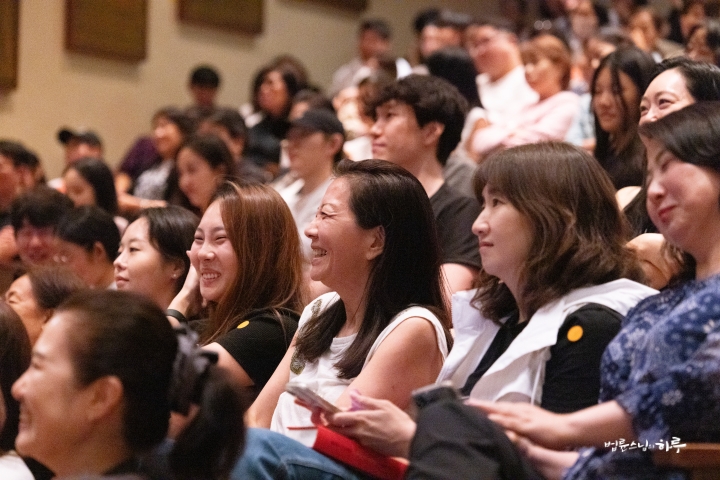
“The two of them fight often, and when they talk to me, each explains the situation in a way that favors themselves. It’s difficult to judge who was right or wrong.”
“It seems like when siblings fight, parents try to determine who was right or wrong and make a judgment. But this is the wrong perspective. There is no inherently right or wrong action. They are just different, not a matter of who is right or wrong. The two fight because they have different opinions, different interests, and different positions. In such situations, parents shouldn’t judge whether the older or younger child was right. The parent’s role is to help them understand that they have different opinions and positions. 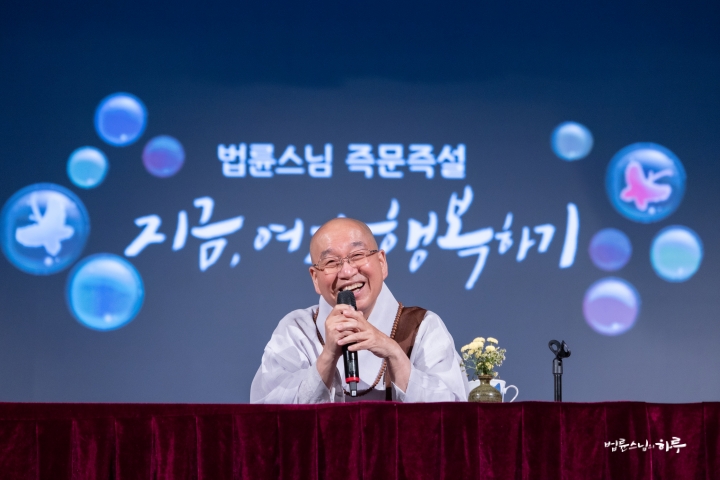
Treating children as defendants while parents act as judges is not education. Even if it’s coaching content, you need to be selective about what you watch. When siblings fight, don’t divide it into ‘who is right’ or ‘who is wrong.’ Instead, take the perspective of ‘The children have different views. Let’s ask about each of their positions.’ Listen carefully to what the children say, help them understand that the older sibling’s position, the younger sibling’s position, and each sister’s position are different, and help them understand each other’s opinions. This is the parent’s role.”
“But they fight too often.”
“It’s okay for children to fight a bit as they grow up. Fighting isn’t necessarily bad. In the old days, families raised three or four children in one house. One day, parents would buy candy and divide it equally among their four children. Sometimes the youngest would cry wanting more candy. To calm the crying, parents would tell the older child to give up one piece of candy for the youngest. But what happens after the parents leave? The older sibling doesn’t stay quiet. They take back the candy given to the youngest, saying it was originally theirs. This is how children learn about social order. 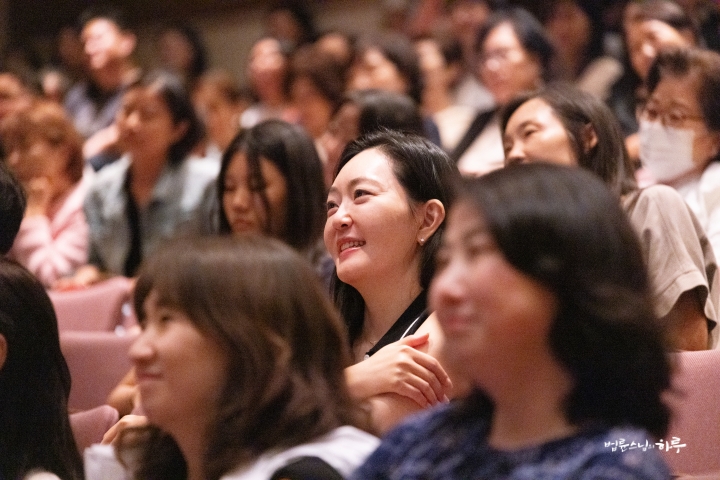
However, nowadays, since most families have only one child, children only experience the parent-child relationship and find it difficult to experience the horizontal order that comes from sibling relationships. This sometimes leads to behavior that lacks manners or proper etiquette. Children who grow up being treated like princes and princesses have difficulty adapting to school precisely because they cannot form horizontal relationships. When there are multiple siblings, they fight frequently, but through fighting, they learn social order.
Therefore, when children fight, it’s important not to interfere too much but rather to observe. However, they should not use violence against each other, take things by force, engage in sexual harassment, or use severe profanity. While conflicts may lead to fights, basic social norms must be maintained. These aspects need to be addressed and mediated when necessary. Children fight and then quickly reconcile, laughing and playing together again. Unlike adults who might never speak again after a fight, children fight in the morning, play happily in the evening, and fight again the next morning – this is how they grow. There’s no need to view it as seriously as adults do. However, when violence is used or important social norms are violated, parents must intervene for the child’s future. Otherwise, it’s best to observe without interfering. 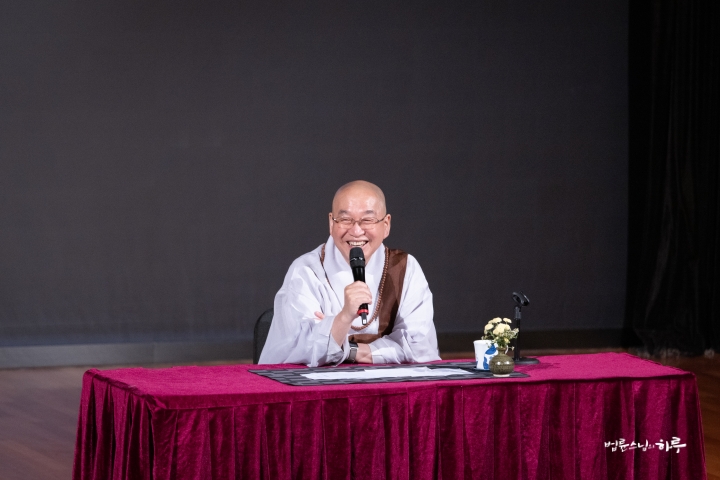
Children grow together by fighting and developing affection for each other. When they’re in middle or high school, fighting with friends rarely turns them into enemies. Sometimes they even become closer after a fight. The same goes for siblings. Parents shouldn’t react too sensitively but should always watch over them, and only intervene when important social norms are violated or when it could become criminal. While getting along quietly without fighting might seem like a good relationship, sometimes the colder and worse the relationship, the less likely they are to fight. Please be selective when watching parenting coaching videos.”
“Thank you. I understand well.”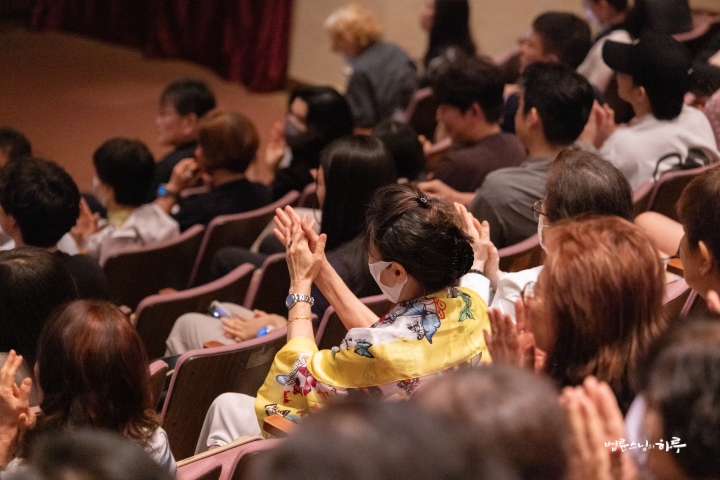
Questions continued one after another.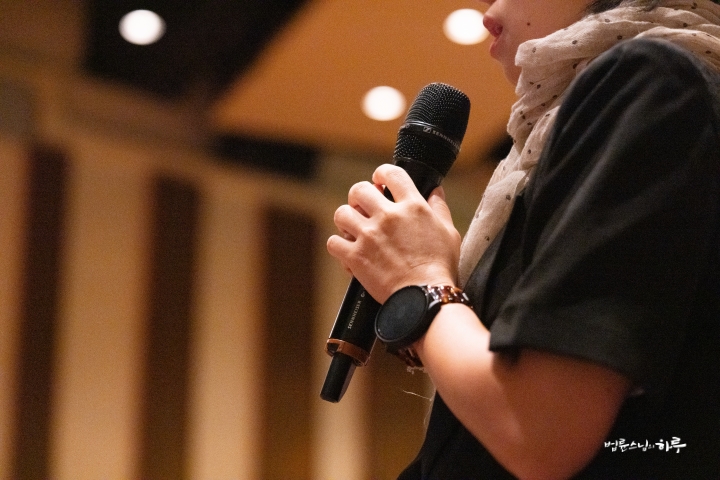
I enjoy volunteering, but I have a hard time saying no, which sometimes makes things difficult. How can I learn to say no?
My mother’s expectations and mine are different, which makes me unhappy. How can we both be happy?
I’m a mother of two sisters who are one year apart. The younger one is very talented, which makes the older one feel discouraged. As a mother, I sometimes find myself in a difficult position. What should I do?
My husband from Gyeongsang Province has significant problems with his parenting methods. I’m worried his forceful and violent approach will cause language development and personality disorders in our child.
I feel anxious in daily life due to bad memories from the past. Is there a way to find peace of mind?
Due to the complicated relationship between my grandmother, mother, and aunt, and my mother’s influence, I’ve also become distant from my aunt. How can I resolve this uncomfortable feeling?
I’m currently 40 years old, but I don’t feel as happy as when I was younger. How can I be happy?
I’ve lived very diligently, but since my child went to college, I don’t know what to do. How can I live as enthusiastically as before?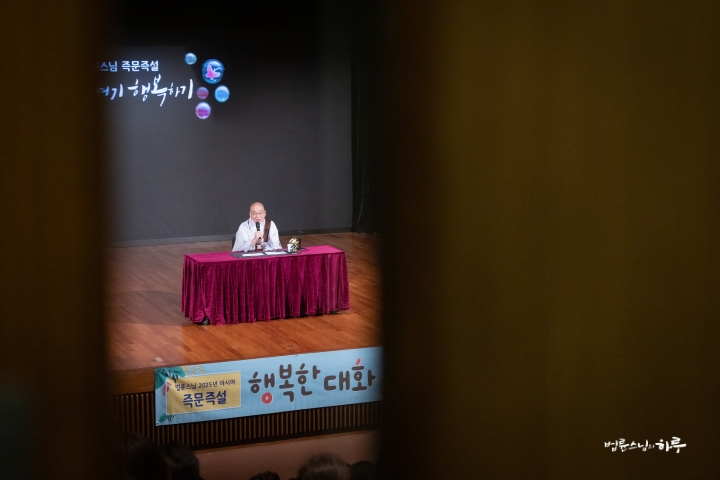
After finishing the dialogue, it was past 9 PM. Sunim immediately held a book signing session on stage. The Korean residents who attended the lecture lined up to receive Sunim’s autograph and exchange greetings.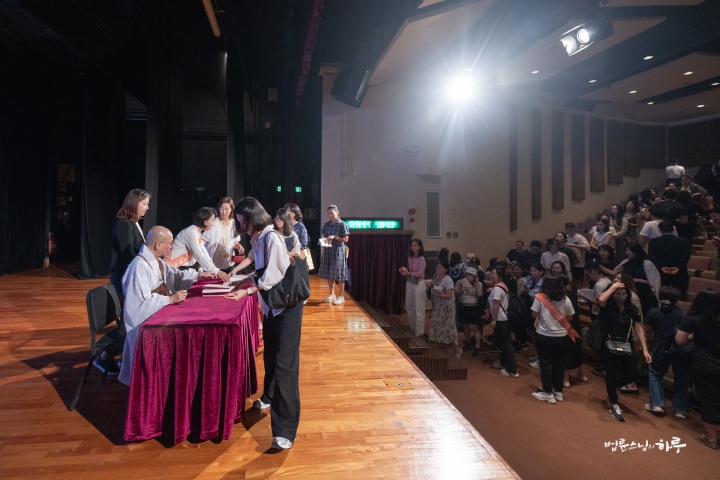
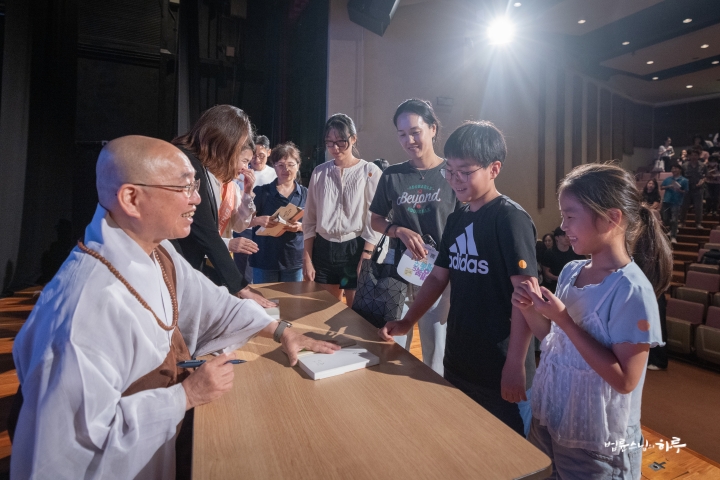
After the book signing, Sunim took a commemorative photo with the volunteers who prepared the lecture.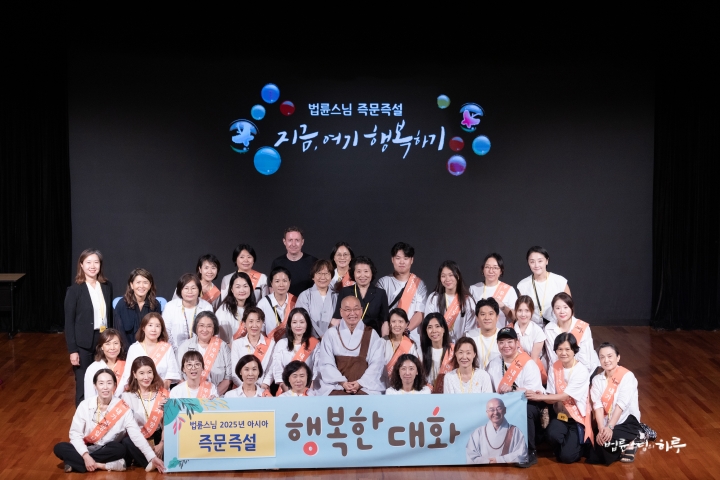
“Hong Kong, fighting!”
After expressing gratitude to the volunteers, Sunim moved to the accommodation.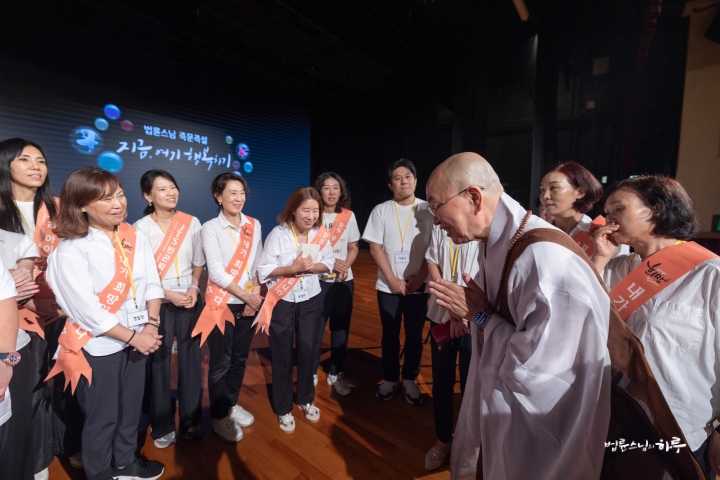
The volunteers sat in a circle with Dharma Teacher Myodeok and had a mindful sharing session. Everyone expressed their joy at successfully completing the lecture.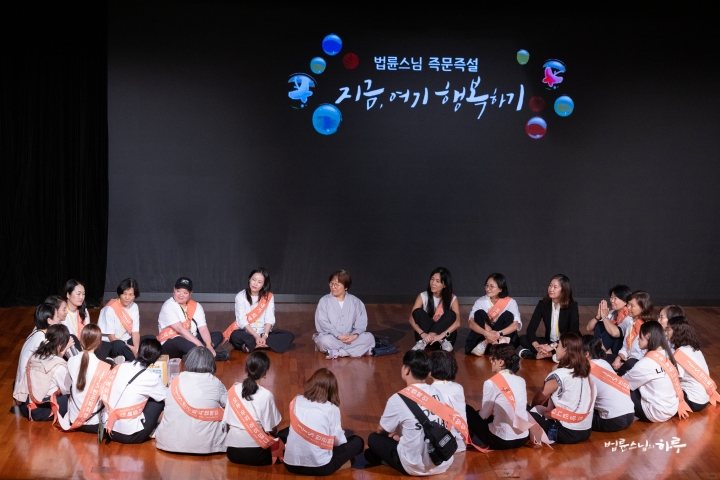
“I’m a Catholic who attends church, but I came to volunteer today. Venerable Pomnyun Sunim’s lectures always have exceptional depth. Today was no different. I thought I should bring more sisters from church next time.”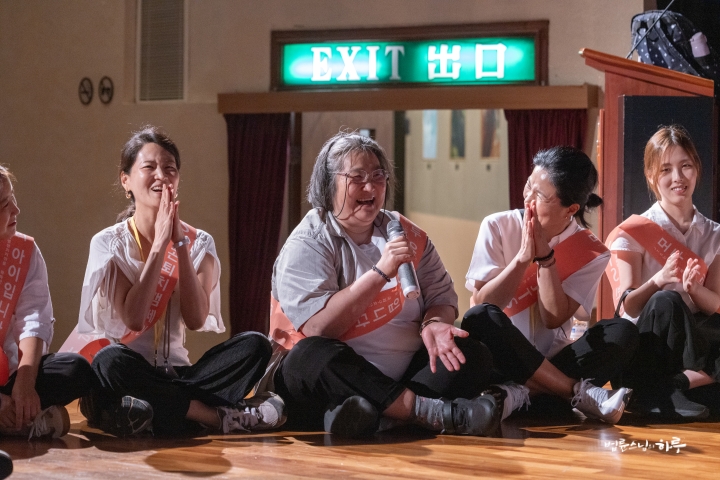
“I used to just attend lectures whenever Sunim came to Hong Kong. By volunteering this time, I newly realized how many volunteers pour their hearts into making just one lecture happen.”
“I was in charge of promoting the lecture. As the seats filled up, my heart also filled with joy.”
“Organizing a lecture is a huge undertaking, but when many people work together, it seems to finish easily. I experienced what they call ‘Mosaic Buddha.'”
Among the volunteers was someone who came with her daughter. She had volunteered with her daughter in 2014 as well, and the young daughter had grown into a middle school student who now speaks Korean well. The daughter shared her thoughts after volunteering.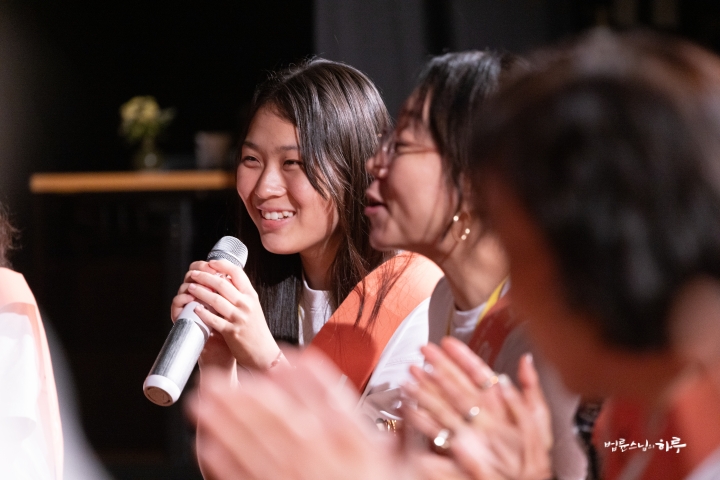
“I was in charge of external guidance today. After listening to Sunim’s Dharma talk, my life goals became clear.”
Finally, Kim Eun-ju, who oversaw the lecture, shared her thoughts in an amusing way.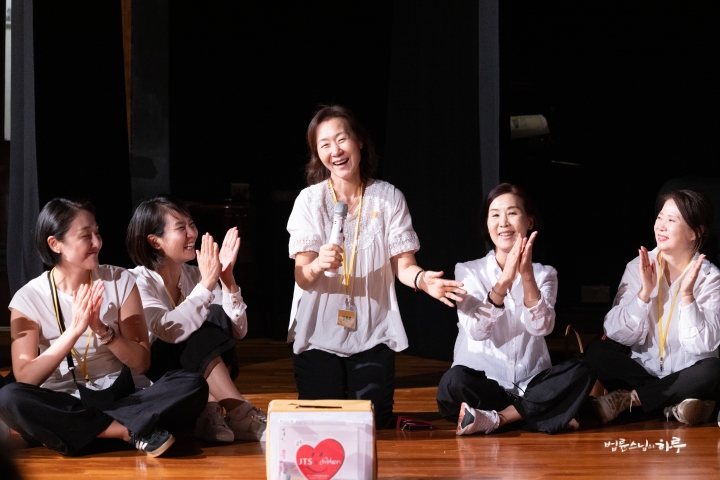
“Living in Hong Kong for 21 years, I realized I came to Hong Kong to prepare for this lecture. I rarely had chances to meet Koreans here, but while preparing for this lecture, I met so many Koreans. While preparing for this lecture, my name became ‘Jungto Society.’ Next year, I’d like to try preparing a lecture with Cantonese interpretation. Fighting!”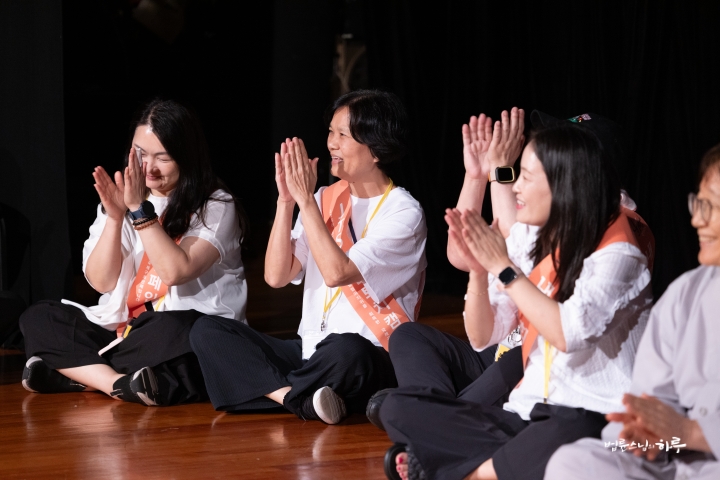
Despite not being prepared by a professional event organization, the lecture was successfully completed thanks to the volunteers’ dedication. Finally, Dharma Teacher Myodeok gave encouraging words to the volunteers.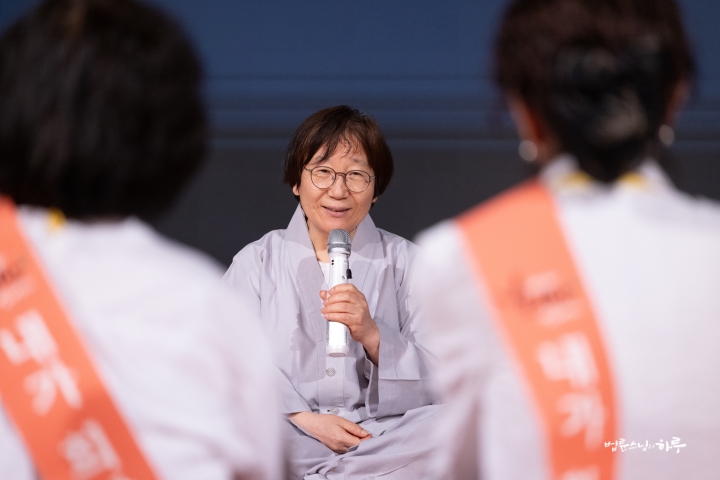
“Thanks to your volunteer work, many people’s lives are changing. Today, Sunim gave particularly profound teachings about child education. When parents change after hearing Sunim’s words about child education, their children’s lives also change. Many of you mentioned observing your own minds while volunteering – this is practicing the unity of work and practice. I hope you’ll continue practicing happiness in daily life by enrolling in the Jungto Dharma School.”
The sharing session ended with loud applause, encouraging each other for their hard work.
It was past 11 PM when they returned to the accommodation. It had been a long, long day.
Tomorrow morning, Sunim will depart from Hong Kong Airport to Taiwan, and in the afternoon, he will continue with the fourth lecture of the Asia tour in Taiwan.





